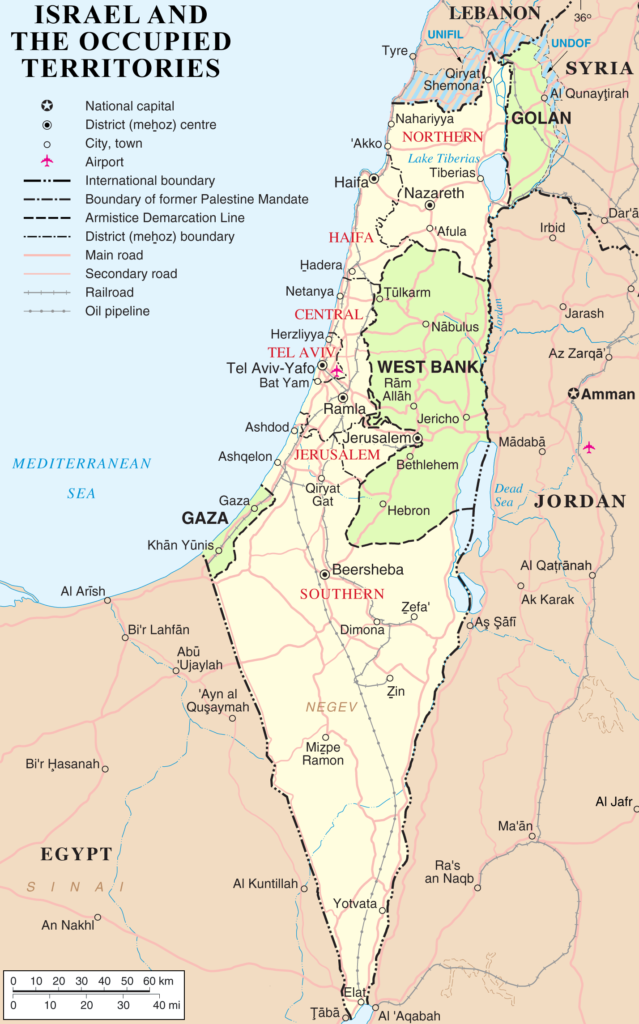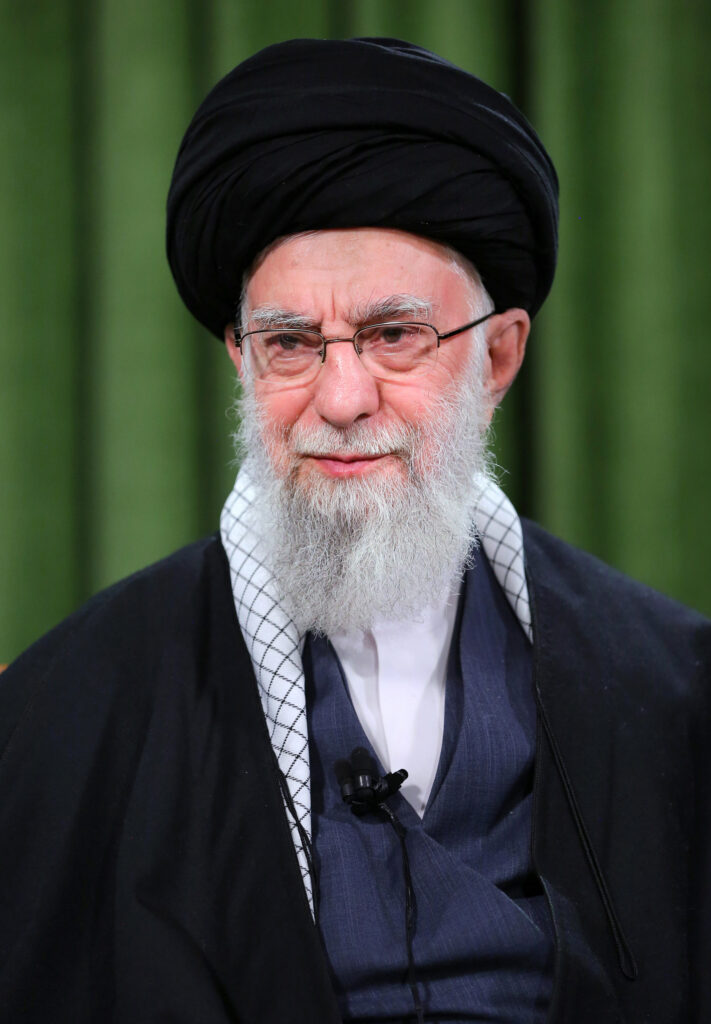Triangulating the War – Israel is boxed in against Hezbollah in Lebanon, Houthi in Yemen, Hamas in Gaza and now Iran has entered widening the conflict in the middle east – What does this mean for the US, the iron clad ally of Israel?
 The Middle East has virtually been triangulated as Israel finds itself boxed in by Hezbollah in Lebanon, Houthi in Yemen, Hamas in Gaza and now Iran in Tehran. The Muslim brotherhood has joined to vow revenge against Israel for killing the Hezbollah leader Hassan Nasrallah in Beirut in an underground bunker along with his 2nd in command Kaouki. The long-feared “wider war” in the Middle East is here, says David E Sanger, a New York times columnist who specializes on Middle East affairs. Ever since the October 7 slaughter of 1200 Israeli soldiers on Israeli soil in an ambush by Hezbollah fighters, the images of the carnage have been doing the rounds for the last one year almost around the globe whipping up sympathy for Israel. US President Joe Biden had warned against allowing a terrorist attack by Hamas to spread into a wider conflict with Iran’s other proxy force, Hezbollah, and ultimately with Iran itself. But that’s exactly what has happened with an adamant and stubborn Israel PM Benjamin Netanyahu not heeding the warnings of Biden. The middle east war is spiraling out of control to the detriment of both Israel and the USA at a crucial time when America is going through a presidential election. Analysts say that Netanyahu is deliberately holding back on any ceasefire until the November 05 elections are over this year because he dislikes “democrats”. Iran, Russia and Iran may be enemies – but all three want ex-President Donald Trump in the White House in the 2024 election.
The Middle East has virtually been triangulated as Israel finds itself boxed in by Hezbollah in Lebanon, Houthi in Yemen, Hamas in Gaza and now Iran in Tehran. The Muslim brotherhood has joined to vow revenge against Israel for killing the Hezbollah leader Hassan Nasrallah in Beirut in an underground bunker along with his 2nd in command Kaouki. The long-feared “wider war” in the Middle East is here, says David E Sanger, a New York times columnist who specializes on Middle East affairs. Ever since the October 7 slaughter of 1200 Israeli soldiers on Israeli soil in an ambush by Hezbollah fighters, the images of the carnage have been doing the rounds for the last one year almost around the globe whipping up sympathy for Israel. US President Joe Biden had warned against allowing a terrorist attack by Hamas to spread into a wider conflict with Iran’s other proxy force, Hezbollah, and ultimately with Iran itself. But that’s exactly what has happened with an adamant and stubborn Israel PM Benjamin Netanyahu not heeding the warnings of Biden. The middle east war is spiraling out of control to the detriment of both Israel and the USA at a crucial time when America is going through a presidential election. Analysts say that Netanyahu is deliberately holding back on any ceasefire until the November 05 elections are over this year because he dislikes “democrats”. Iran, Russia and Iran may be enemies – but all three want ex-President Donald Trump in the White House in the 2024 election.
Now, after Israel reportedly assassinated the Hezbollah chief, Hassan Nasrallah, and began a ground invasion of Lebanon, and after Iran retaliated by launching nearly 200 missiles at Israel, it has turned into one of the region’s most dangerous moments since the Arab Israeli War of 1967.
Worry: How much is the conflict going to intensify, and whether the United States’ will put its military boots on the ground in the middle east war, which is not its own, but Israels. Another imprudent exercise after the occupation and evacuation of Afghanistan, analysts ask. The past few days may prove to have been a turning point. Since Israel killed Mr. Hassan Nasrallah, the Biden administration has been shifting from cautioning against a wider war to trying to control it. White House Officials have defended Israel’s right to strike back at Iran, but Mr. Biden that he would not support direct attacks on its nuclear facilities that could tip the conflict out of control, warning that Israel must respond “proportionally.” Israel does not know the meaning of a proportional attack or response, analysts say.
A month of escalating air attacks
Israel is fighting adversaries across the Middle East: Hezbollah in Lebanon, Hamas in Gaza, the Houthis in Yemen and Iran.
OIL RICH QATAR, EGYPT, U.A.E., SAUDI ARABIA, OMAN. SUDAN- the entire middle east is caught in a cauldron that it did not want to be entrapped in and has been playing the mediators role to enforce a ceasefire, release remaining 100 odd hostages still held by the Hamas in Gaza and propose atwo-state solution as a permanent agreement to enforce peace in the region. War only aggravates crude oil prices and disrupts supplies which the middle eastern nations under the OPEC direly want to avoid. This is the spiral that Mr. Biden has cautioned against repeatedly, but has not been able to stop, even with 40,000 American forces in the region. “From Israel’s perspective, we have been in a regional war since. 7, and that war is now an all-out war,” said Michael Oren, a former Israeli ambassador to the United States, a historian and one of the country’s more hawkish diplomats. “We are in a war for our national survival, period. “Winning over the next few weeks, he said, is a “duty” for a nation “created in the aftermath of the Holocaust.” The unknown is how Prime Minister Benjamin Netanyahu of Israel will interpret that existential mission as he weighs how, not whether, to strike back at Iran, Says Sanders, a New York Times columnist who specialises on the Middle East affairs. Mr. Biden’s warnings started early, on his visit to Israel less than two weeks after Oct. 7, to show solidarity after one of the most gruesome terrorist attacks of modern times. That was before Israel obliterated Gaza from above and sent its military in on the ground, against Mr. Biden’s advice in a series of heated conversations with Mr. Netanyahu. Now, that was before Israel booby-trapped pagers and walkie-talkies used by Hezbollah that exploded across Lebanon, and before Mr. Netanyahu reportedly approved the plan to kill Mr. Nasrallah and systematically decapitate much of the Hezbollah leadership.
 It was before the administration hinted last week that Israel had agreed to join a 21-daycease-fire, only to be defied, again, by Mr.
It was before the administration hinted last week that Israel had agreed to join a 21-daycease-fire, only to be defied, again, by Mr.
Netanyahu, who did U turn and authorized the strikes into Lebanon killing Hassan Nasrallah, inflating passions. In a rare move, Iran’s supreme leader Ayatollah Khamenei led Friday’s Prayer. Israel expands evacuation warnings in southern Lebanon after airstrikes hit near Beirut. As Biden faces critics on the right, this is all the result of American hesitancy, his unwillingness to back Israel unconditionally and his understandable tendency to nuance every promise of aid with a warning not to make the mistakes the United States made after the Sept. 11 attacks. As critics on the left attack him, what has happened in the past is another example of Mr. Biden’s failure to make use of American leverage over Israel, including the threat of withholding American weapons after more than 41,000 people died in Gaza as per
Palestinian health ministry reports. While several thousand of those killed were almost certainly Hamas leaders or fighters, a vast majority were civilians. Collateral damage. For Israelis, hemmed in from all sides geographically by Muslim brotherhood and Muslim nations, this escalation was inevitable, another chapter in a struggle for survival that began with the nation’s creation in1948. 
Mr. Netanyahu clearly has America’s backing to retaliate against Iran. At the White House Jake Sullivan, Mr. Biden’s national security adviser said the Iranian attack had been “defeated and ineffective,” largely because of the coordinated efforts of American and Israeli forces, who had spent months planning how to intercept the incoming missiles. “We have made clear that there will be consequences —severe consequences — for this attack, and we will work with Israel to make that the case,” Mr. Sullivan told reporters. Mr. Sullivan is on record saying the White House was consulting extensively with Israel, including with the prime minister’s office, to formulate the appropriate response. He emphasized the degree of communication, leaving unsaid the obvious: Mr. Biden and Mr. Netanyahu barely talked as Israel took the fight to Lebanon, planned the Nasrallah operation and the ground invasion. But once Iran, a lethal threat to Israel with military powers that Hamas and Hezbollah can only aspire to, directly entered the fray, America’s tone and strategy changed — and so have Israel’s. The behind-the-scenes negotiations now boil down to Mr. Netanyahu’s intent. Will he send another message to Iran about what Israel could do in the future, as he did in April when he aimed at military facilities in the holy city of Isfahan? Will he take out oil production facilities and ports? Will he hit Iran’s nuclear facilities? Will Iran clandestinely hasten its uranium enrichment programme to make the dirty bombs with the help of Pakistan, China, Russia and North Korea? Or will he aim directly for the facilities he has threatened to strike for years, starting with the underground Natanz facility where Iran is enriching uranium to near-bomb grade? American officials believe they can persuade Mr. Netanyahu to make his point without setting in motion a full-blown war. But they concede that the Israeli prime minister may see the next five weeks until the American presidential election as a ripe moment to try to set that program back by years. After all, former President Donald J. Trump would not complain about a major attack on Iran’s military infrastructure, and Democrats cannot afford to be accused of restraining Israel after a missile attack. “Israel will do its best to be disproportionate,” Gen. Wesley. K Clark, a former supreme allied commander of NATO, said on CNN. White House officials take the opposite view: Mr. Netanyahu, they say, cannot afford to be anything but proportionate. Meanwhile, USA is strengthening its ground forces in the Middle east by putting boots on the ground of some 41,000 soldiers, mobilising its navy in the middle east waters with more than three major aircraft carriers and destroyers to take out the Hezbollah in Lebanon and the Houthi in Yemen. American war machinery is in place in case of a full-blown war.












































